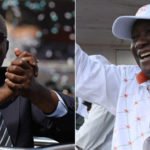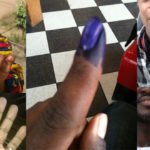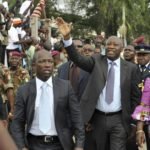Open Letter to Barack Obama (also sent to the office of the President of the United State).
Mr President, I hope this finds you well! I am writing to express my surprise and disappointment at the position expressed by your administration as it relates to the post election turmoil in the Ivory Coast. It unfortunately seems to reflect a lack of understanding of the history of my country and a disregard for our laws and political institutions. I am writing to you because I am a great admirer of yours as most Africans are. I would have expected that your constitutional law background would have helped you keep your objectivity and overlook the position of your French ally to seek understanding of the true nature of the issues in my country. The Ivory Coast is a peaceful country. Ivoirians are peaceful people. Various ethnic groups and religions have coexisted peacefully in the Ivory Coast until Mr Ouattara arrived on the political scene a few years ago hungry for power for unexpressed reasons. The will of the people that the Mrs Rice claims that the United States wants to protect needs to be better understood.
Mr Outtara is not a problem because of his religion, Ethnicity or even political convictions! He is a problem because of his relationship with foreign leaders that do not have a history of caring much for the welfare of the people of the Ivory Coast. Mr. Obama, you have fought to become president of the United States because you had a genuine will to accomplishing something great for the people of the United States (and for those of us that are fortunate to share this roof). Mr Outtara does not have an agenda for the Ivory Coast other than becoming president at all cost and serving the interests of those who put him in power. That’s the problem that Ivoirians have with him! As for the President of the Ivory Coast Mr Gbabo Laurent, he is the only president of a former French colony who has dared say NO to Paris, and stand for the good of his people. Ivoirians have awaited that for 50 years! That’s the reason why Ivoirians respect him and will support him.
I find it odd that the United States finds itself on the side of rebels who have killed, burnt, stolen and raped to be where they are today. Does Mrs Rice know that? I find it strange that The Electoral Commission would proclaim results at the headquarters of one of the candidates (guarded by rebels). I find it strange that Mr Ouattara be guarded by rebels who attacked the nation. Where was the United Nations when the people of the Ivory Coast were attacked in the first place? Where were the UN resolutions when the French military was shooting kids in the streets in 2006? Where was the international morality? Where was the rule of law? Where were the journalists (who claim to be the voice of the voiceless)? Did Mrs Rice really do her homework on the Ivory Coast? I do not believe that she did! You are betting on the wrong horse Mr President! You have either been misguided, or you are simply telling the people of the Ivory Coast that you are de facto siding with France. So what is it Mr. President? The people of the Ivory Coast demands to know. The children of Africa demand your answer, expect your leadership! Give 10 minutes to the issue!
It feels kind of strange to write something knowing that it will be read. I learned of Abraham Lincoln that he often wrote letters that he filed away to give himself the impression that he had dealt with an issue; done what he could or simply emptied his mind. I always found that strange but as I knowingly and vigorously deep my sword in a fishless fish-less pond by writing this letter, I do feel that it helps… It does give me the coward satisfaction that I have played a small part in getting your administration to realize that you unfortunately got it wrong this time. I would be honoured to have the opportunity debate this with Mrs Rice can spare the time. For now, God bless you and your family! I wish you a Merry Christmas and a fantastic New Year!
Edwin Bosso
Houston, TX



















Mr. Edwin Bosso, Houston, TX
Before you sit down to write rubbish like this, I think you ought to use your tiny brain to think. You see, Obama is not a president from Cote d’ Ivoire or Togo, but from one of the best democratic countries in the world. Giving this background, any decision by USA or EU or others is based on respect of law and above all, respect of what had been agreed between parties. It seemed to me that you lack so much intelligence in such as way that you are distorting in your imagination. Your idiot Gbagbo is a dictator, liar, untrustworthy person and above all a dishonest individual.
Panafricanism should be constructed on philosophy of integration and not reject. By rejecting people from the North of your country, you are playing racist card against your own people. Your arguments of Mr. Ouattara are a poppet of foreigner’s powers is ludicrous, stupid and unintelligent. We all want FranceAfric to stop, but the moment your people chose at election to elect Mr. Ouattara, with concrete evidence hammered by ONUCI, your Gbagbo will never govern Cote d’ Ivoire. If he dares to cause civil war, he and his entourage will sooner or later arrested and punish by law.
Goncalves Rhys
Denmark
I thank you all for expressing yourselves, by telling the whole world what’s going on in our country.Mr Goncalves,i think we are all grown up and we must all know what we are talking about,let us just watch our tongue and not use some negative words while addressing a note to the nation. We all know that ivory coast is a sovereign country like Usa,France,China,Japon,Togo and others.We all know what’s happend in the United states of America during the election opposing Georges bush and algor,at the end the president of the constitution who is the final decider tranched in favor of Georges Bush and the whole country obeied,so why can’t we do the same thing and stop accusing someone of being dictator,someone who does not like the people from the north,by doing this,we are showing the whole world that there is no law in our country.At this 21st century, do we have to allow some other countries to choose our president?to tell us what to do? I say NO,NO and NO,Ivorians say NO,let us show the whole world that we are matured , and we can handle our own affairs,so please let us simply tell the Pdt of United States of America the truth,i mean which he was not even allowed to know,let us tell him the truth ,the whole truth,let us tell him why France is taking this action,let us tell him why Sarkozy wants Ouattara,but before we tell him all this,can we also ask ourselves why Sarkozy wants Ouattara to be president absolutly? is it because he is the smartest in our country?or the most handsome ? if No,so why does Sarkozy wants him ? Sarkozy is not interested in that man,but what he is going to get if that man becomes pdt,that’s what interested Sarkozy,but unfortunately he will never succeed, simply because ivorians are not ready to sell their country, we are tired of renting our own house of parliament from France,can we imagine that?in our own country,come on.
Mr president we just want you to call Sarkozy and ask him why he cost to cost wants Ouattara to be the president? believe me ,he will never give a reasonable answer. Shall we look at the interests or the people?shall we look at what we will get or how fare can the country goes,what we can do so that these countries will be responsable and taking their decision without including us?
President Obama, we love you and also voted for you, so please help us so that we can still be with you,so please have confidence in you and tell Sarkozy the truth, tell him that you cannot support what he wants you to do,just tell him that now you heard the truth about Ivory coast, by tellig the whole world to accept Ouattara as a president,is simply asking the whole country not to believe that you are the president of the United States of America, so please help us,we have our families back home so please don’t take negative position where the whole country loves you. We love you,and we want to respect the president of the constitution of Ivory Coast who said that Laurent Gbagbo is the president, so please tell Ouattara to recognize it and obey the law,he can try agin after five years.
Thank you very much Mr President for your understanding and may God bless you.
Eric Adjeb
you are such an ignorant. for Centuries the western have stolen Africa and used its richness for their own good.
From slavery to colonization to neo-colonianialism that prevail today. the USA and EU do not care about Africa and African, even in America democratie is not what it is. Who said that Bush had won the presidential of 2004 as after he cheated in Florida? The Supreme Court. who said a word? Nobody. Why do they have to feel like they have to now come and violate the sovereignty of Ivory Coast? The result given by the electoral commission were not the final one. it is up to the constitutional conseil to validate and proclame the definitive results.
Bob
USA
Only in Africa a black president with his white spouse will govern a country. I say no! You will never see that in Asia, Europe, MiddleEast or in Latin America no where in the world not in our life time. Do not count on the black elites to protect and preserve our naturels resources…Fight African fight for your health.
West Australian Legislative Assembly
[Tuesday, 19 October 2010]
REMOVAL OF CHILDREN FROM UNMARRIED MOTHERS — APOLOGY
Standing Orders Suspension — Motion
MR R.F. JOHNSON (Hillarys — Leader of the House) [3.03 pm] — without notice: I move —
That so much of standing orders be suspended as is necessary to enable the Premier to move a motion in relation to past adoption practices, and that the debate be conducted under the time limits determined for a matter of public interest.
MR M. McGOWAN (Rockingham) [3.03 pm]: Obviously, the opposition is agreeable to this, and we have appreciated the degree of cooperation between both sides in bringing this matter forward.
Question put and passed with an absolute majority.
Motion
MR C.J. BARNETT (Cottesloe — Premier) [3.04 pm]: I move —
That this house notes —
(1) that with regard to past adoption practices, it is now recognised that from the 1940s to the 1980s the legal, health, and welfare system then operating in Western Australia, in many instances, did not strike the correct balance between the goal of minimising the emotional and mental impact of the adoption process on unmarried mothers, with the
goal of achieving what was considered at the time to be in the best interests of the child;
(2) that processes such as the immediate removal of the baby following birth, preventing
bonding with the mother, were thought at the time to be in the mother’s and the
child’s best interest;
(3) that this house recognises that in some cases such practices have caused long-term
anguish and suffering for the people affected; and
(4) that the Parliament acknowledges that previous Parliaments and governments were
directly responsible for the application of some of the processes that impacted upon
unmarried mothers of adopted children, and now apologises to the mothers, their
children and the families who were adversely affected by these past adoption
practices, and I express my sympathy to those individuals whose interests were not
best served by the policy of those times.
Mr Speaker, past practices were very firmly focused on the goal of ensuring that the children of unmarried mothers were provided with the best life opportunities that were available, and the prevailing view of the time was that these life opportunities resided exclusively with caring, married adoptive parents. Options for unmarried motherhood were extremely limited, resulting in incidents where unmarried women gave up their babies for adoption without there having necessarily been proper thought and attention applied to their own wellbeing.
There has been significant change in both law and policy since that time, designed to strike a better and more considered balance of the interests and rights of both children and parents.
On behalf of the state government, and to the extent that previous governments were directly responsible for the application of the processes that impacted upon unmarried mothers of adopted children, I now apologise to the mothers, their children and families who were adversely affected by these past adoption practices, and express my sympathy to those individuals whose interests were not best served by the policy of those times.
Mr Speaker, a large number of the mothers are here today, and I thank them for coming to this Parliament for this apology. I very much hope that today’s apology will bring you some comfort and ease the years of pain, and even a sense of guilt that many of you have so unfairly felt for so many years.
In closing, I thank the Minister for Health and other members of Parliament, including the member for Mandurah, for bringing us to this day and to this apology.
Members: Hear, hear!
[Applause.]
MR E.S. RIPPER (Belmont — Leader of the Opposition) [3.07 pm]:
I rise on behalf of the state Parliamentary Labor Party to offer support for this motion and to recognise that the Western Australian Parliament will today be the first Parliament in the country to formally apologise to mothers affected by past adoption practices.
Adoption is a complex issue with many other affected parties involved. What we do today is sincerely and unequivocally apologise to the mothers who relinquished their babies under duress. We are not seeking to address the issues being dealt with by others—those who were adopted out or the families and other individuals who have been involved in the adoption process. Those issues are for another day. What we do today is unequivocally and sincerely apologise to the mothers for fundamentally flawed government policies that meant your babies were taken from you.
I am sorry and the state Parliamentary Labor Party is sorry. We recognise that Labor governments were involved in these events and we apologise for their roles. Whatever their intentions, they were wrong. I would like to note that in 1993 and 1994, I was closely involved in changes in this place to the Adoption Act to modernise adoptions across Western Australia and to increase openness and flexibility within adoption arrangements. If I can refer briefly to my previous comments on the issue of adoption, I would like to do so. I stated in 1992 —
Adoption is an issue that has touched the lives of thousands of people in Western Australia. Almost one in every 15 people living in this State has been affected by an adoption in some way. Either they are themselves one of the thousands of children adopted, or they are a birth parent who relinquished their child, or they are an adoptive parent. Also included in this network of adoption are the extended family
members of relinquishing parents as well as those of adopting parents.
Today we recognise the experiences of those mothers who were pressured into relinquishing their babies when they were emotionally vulnerable and under duress. Past adoption practices were wrong. The legal, health and welfare systems of this state were not supportive of young unwed mothers and many people were wrongly subjected to government intervention that would have lasting and very personal consequences. The way so many adoptions were carried out across the 1940s through to the 1980s was a judgement made according to the values of the time. If we were to be presented with these issues today, both the government and the opposition would take a different policy approach.
What happened across these years is not condoned by anyone in this house. The removal, forcible or otherwise, of babies from their mothers who were under duress is not condoned. Whatever the circumstances of so many of these women, they were not able to give informed consent. Society at the time believed that these young unmarried women chose to give up their babies, but it is unimaginable that any consent could have been informed consent. Traumatic birth experiences, a lack of information, emotional vulnerability, and extreme
pressure from higher authorities—including doctors, matrons, lawyers and welfare officers—resulted in signed consent forms and consequences that would severely scar all involved for decades to come.
We recognise that these events were a product of the time, but today we reflect on how much has changed and how in today’s society it would be unacceptable to be party to these forced adoptions. Recognising the attitudes that underpinned these policies is not to excuse the actions of those who took babies from young unwed mothers. We also recognise the wrong and it is because we do, that we apologise.
The deep and profound sadness experienced by mothers who join us here today and who live across our state will be a legacy of this period in history. We recognise that lives have been irrevocably affected. Having a newborn baby taken away in traumatic circumstances is an event that I can scarcely imagine. We also apologise for mothers not having the chance to see their newborn baby, bond with it and continue the love that had developed while in utero.
To the mothers who have endured such suffering, you are survivors. To survive mentally, emotionally and physically the trauma that was inflicted upon you is a credit to the strength of your spirit and character. To now continue that fight today is something that you can feel very proud of. I know many of you are thankful that your children were placed in loving and caring homes, but you still retain the scars of having your babies taken from you. Today we offer you our compassion, understanding and recognition for the struggle that you have endured. We acknowledge that when you were at your most vulnerable, those who should have offered support, advice and understanding were amongst those who failed you the most. We recognise that this apology does not repair the trauma and damage done to you so many years ago. Nevertheless, Parliament hopes that in offering formal recognition of your experiences, you may be able to move forward with the healing process. Today, in an effort
to create a more just and dignified Western Australia and also to enable mothers affected by these adoption processes to heal, we have recognised errors of the past that happened right here in our state. I am sorry for what you endured. The state Parliamentary Labor Party is sorry for what you endured.
[Applause.]
DR K.D. HAMES (Dawesville — Minister for Health) [3.14 pm]:
In case it is more difficult at the end, before I start I will advise members and the public gallery that we will have an afternoon tea in the Aboriginal People’s Room for anyone who wishes to attend. I invite all of the members of the chamber and indeed the press gallery
to attend.
Members of this house will be aware that I very seldom read a speech in this house, but this is one of the few times I intend to do that because I think it is critical that I get the words out that I want to say.
I wish to first acknowledge the presence in both galleries of visitors from across Australia who are here to hear this apology to mothers whose children were taken from them for adoption. I welcome you all and I hope that this apology will publicly recognise your loss and help to ease the pain and suffering that has affected many of you for a large part of your lives.
Firstly, I would like to commend the Royal Brisbane and Women’s Hospital for the letter of apology it issued 18 months ago. As members know, it was the first to do so and Western Australia will be the first Parliament to do so. In July 2009, when approached by Channel Seven as part of a documentary on past adoption practices, I was asked if the state government would follow the lead of the Queensland hospital and apologise to the mothers
affected. My first reaction was to question the need for government to apologise when both public and private hospitals managed pregnant unmarried women in the same way.
I then had the opportunity to meet with some of those mothers in my office to obtain a far greater understanding of their treatment during that time and to gain a greater appreciation of the need for and the benefits of an apology. One of the mothers whom I met explained to me that while the apology could not heal the hurt that she had suffered for so long, it would make all those involved in the process understand that she had not given up her child because she did not want it, but because the process that led to the adoption was so flawed that the option
of choice was effectively removed.
Between the 1940s and 1980s, societal attitudes were unsupportive of pregnant unmarried women and the options for unmarried mothers were extremely limited. As a result, unmarried women felt enormous pressure to relinquish their children for adoption. With no single parent benefit until 1974 and the negative attitudes of society, these mothers were made to feel shame and guilt if they did not give up their babies for adoption. The majority of the women affected not only were pressured by the social stigma of being unmarried, but had not reached the age of consent. Therefore, their parents or guardians bore the final responsibility for approving the adoption.
The management within our hospitals also caused enormous stress to the mothers and families involved. At the time, the view of health practitioners and society was that it was in the best interest of the mother and the child that the normal bonding process that occurs at birth should not be permitted. At the time of delivery, mostly already under the influence of pain-reducing drugs, mothers were refused any chance of seeing or even touching their babies. Some had their eyes covered. Some had barriers erected between them and their babies. Immediately following delivery, their children were taken away and, in many instances, never seen again. As members can imagine, such a practice for young vulnerable mothers was extraordinarily traumatic and has left for many an aching, empty void that can never be filled again.
I have received a large number of letters and emails from all over Australia regarding today’s apology. The majority, but not all, have been supportive. I have chosen a segment of those to read to the house so that the Parliament can gain a greater appreciation of the importance that many mothers attach to today’s apology. These are all small excerpts from each letter, according to my notes.
The first letter states —
Please accept my congratulations and a heartfelt thank you for your decision to apologise. Also, may I request a copy of the apology to hang on the wall so that I can see it every day?
The second letter states —
On behalf of the mothers I represent I wish to convey my sincere appreciation for the government’s decision to apologise to the mothers, their children and families in relation to past adoption practices. We know that you personally have recognised deeply the painful and enduring negative effects that continue to afflict our lives.
The third letter states —
My mother was one that was affected by the actions that will be the focus of your apology in Parliament next week.
Obviously, the letter was written last week —
Unfortunately my mother passed away yesterday in Brisbane and will not get to hear the apology delivered or see it in writing. I am pleased to say that I was able to let her know of your apology plans prior to her death and it gave her great joy. Her funeral is in Brisbane next Thursday —
(That is this Thursday —)
and I would very much like to include some aspects of the apology at her funeral.
A letter from a person in Victoria reads —
Thank you and thank you again. I never thought I would see this day in my lifetime—you could never know just how much this means to me and so many other mothers.
Another wrote —
I am so very pleased that there will be an apology made in Parliament to all the women so deeply traumatised at having their babies taken from them at birth. Please also acknowledge the nurses as we have also been affected by the role we had to play in this abhorrent event.
I also had a letter from an adoptee that said —
I am so overwhelmed that an apology is being offered to the mothers who lost their babies as a result of the adoption act that I am lost for words. I saw firsthand the trauma; my own, my mothers. I believe my mother died with a broken heart, a broken spirit. I thank you from the bottom of my heart for the incredible gift you are delivering to the mothers, including my own. I just know how much it would have meant to her and thank you in advance for the healing to come over time as a result of your actions.
The last letter I will read was from a sister —
I breathe a sigh and shed tears of relief for all those unmarried mothers who have been traumatised by the archaic practice of the hospital and welfare authorities. It certainly wasn’t in the best interest of “both mothers and baby” as we have been told many times. Instead it left young mothers (not to mention other family members) years of torturous angst wondering where their child was and if they were happy.
Mr Speaker, I have also received letters from adopted children and adopting parents opposed to an apology as they believe that the apology reflects negatively on their actions. I want to make it clear that this apology bears no reflection on them. It is totally dedicated to the mothers who gave up their children and the processes in place that affected them so badly.
Statistics show that many of these mothers have been so affected that they have never again had children. So why should this Parliament apologise to those mothers especially when those events occurred well before any person in this chamber was elected to Parliament? I believe it is right for us to apologise for two reasons: firstly, because it was the government of the day that endorsed those practices in public hospitals and, in retrospect, it can clearly be seen that those practices were wrong and have caused enormous pain and suffering to a great
many people including their families and the staff who were required to administer them; and secondly, simply because we can. There is no institution within our system that has a greater capacity than us in this chamber to recognise and acknowledge wrongdoing, and the pain and suffering that it has caused. There is no collective voice in this state that can present a more powerful message to the public than elected members in this state saying with one voice, “The way in which you were treated was wrong, and we apologise for the pain and suffering that this has caused.” Will this help those mothers? Will such an apology help those of you who are here today? I hope so. It will not remove the suffering that you have endured, it will not remove the deep ache and loneliness within you, but it will say to the world that you did not give your child away because you did not want that child. In many cases the adoption of your child was not even your conscious choice. It will say to the world that we, the Parliament of Western Australia, recognise that your child was removed from you under a
policy and social attitude that was badly flawed, and as a result has caused deep and unending grieving to all mothers involved. To all of these mothers, especially those of you who are present today, and others who have been adversely affected, I apologise.
[Applause.]
MRS M.H. ROBERTS (Midland) [3.24 pm]:
I, too, acknowledge all of those persons affected by today’s motion who are present today at the Parliament of Western Australia. I also acknowledge other affected persons who are unable to be with us today.
Over past years, in less enlightened times, tens of thousands of women lost their children through adoption. If the truth were to be fully acknowledged it would not take much scratching of the social fabric to find adoption experiences in most families. This is certainly applicable to our extended family. My sister-in-law Carmel Ward is present here today. She has provided most of the content for my comments. Carmel’s only child was born on 14 September 1970. Due to the prejudice of the time, her son was registered as an “unnamed” child on his birth certificate. This was contrary to Carmel’s wish, but she was dissuaded from naming him with comments such as, “It doesn’t matter; they’ll give him a new name anyway.” Documents released from his file many years after his birth are notated “Notification of Illegitimate Child” and stamped in bold letters denoting him as “Illegitimate”. His father was listed on the original birth certificate as “Not Stated”. Carmel now sees this as an administrative convenience by those who sought to facilitate the relinquishment process. The father was denied the opportunity to acknowledge paternity of the child which thereby excluded him and simplified the relinquishment process.
Carmel was able to have her son’s original birth certificate corrected in 2000 to show his name as “Charles Edward Peter”. Her son was named “Nicholas Michael” by his adoptive parents. Nicholas has declined contact with Carmel; his surname has not been used to protect his privacy.
Sadly, pregnant and unmarried women were scorned and their children were referred to as bastards and branded illegitimate. The relinquishment formalities were generally conducted with the mother under considerable duress within a relatively short time after birth. There were limited options for mothers and certainly a high probability of rejection by the family and others if she chose to keep the child. Generally, no efforts were made to allow women to bond with their babies. Some, like Carmel, were given limited opportunity to hold their baby at the time of birth. Many did not see their babies. The adoption process, either by misguided altruism or blatant conspiracy, made these unwanted and unnamed babies into a desirable commodity. Through until the 1970s, the supply of children was used to satisfy the demand for babies by childless families or infertile couples. Not all babies were adopted and not all went to childless families; some went to families as a replacement child for a stillborn baby or where there had been a sudden infant death syndrome death. The adoption process severed mothers’ legal rights; children were given new identities. Some children were not told they had been adopted. Many were actively discouraged from searching for their family of origin. Those mothers who had given birth were, by and large, deemed not acceptable or deemed unworthy of the title “mother”. This caused a deep pain and sadness for them. For them, Mother’s Day is hardly a cause to celebrate.
There are diverse views about the term to be used to describe women who have lost children to adoption—
“relinquishing mother”, “natural mother”, “first mother”, “birth mother” and “original mother”—but those mothers gave their child the greatest gift; namely, the gift of life. The mothers who lost their children to adoption were told to forget about the baby and to get on with their lives; that is, not to be a mother. The event was not to be mentioned again by the mother, family and friends, and certainly not mentioned in polite society. These women suffered disenfranchised grief—the loss not acknowledged, the grief unspoken, the mother unsupported. Counselling and emotional support was generally not offered and not available. Their loss was simply not understood. These mothers remember the birthday of their lost child, often observing other people’s children to mark milestones of growth and development, always with a renewed sense of loss and grief. Having subsequent children did not diminish the loss or replace the child. Many women have suffered deep depression throughout their lives, with their sense of loss and grief, rather than diminishing with time, simply increasing with time. Some mothers suffered further as they were not able, for a variety of circumstances, to have other children. Again, this added to their sense of loss. The circumstances of the women who lost children to adoption differ greatly, but the loss that each of them suffered is immeasurable. I fully support and endorse the motion before
the house.
[Applause.]
MRS L.M. HARVEY (Scarborough) [3.30 pm]:
I, too, rise to support this formal apology to the mothers who were subject to forced adoptions over many years. I would like to acknowledge those affected mothers who are here today in the gallery. This is a very distressing issue. Like many members of Parliament, I have met some of the mothers who were subjected to this practice. Some stories stand out and are always remembered.
The mothers who had their children taken for adoption lived with the loss of the child for their whole lives; the worst part being that for many they have been unable to make any connection with the adopted child and have no knowledge of the welfare or whereabouts of the child who was removed. The practice was so flawed and was applied regardless of the individual circumstances. I know of one woman whose son was taken from her at birth
and adopted out. She then went on to marry her boyfriend and they had another son together. They both mourned the loss of their first-born and indeed the experience shaped their relationship. Once adoption laws were changed, they started the search for their first-born. After finding him, it took their son, who is now a part of another family, many years—not months but years—to garner the courage to meet them. Eventually he was reacquainted with his family and met his parents and his brother, who bore a remarkable physical resemblance to him. I use the word “reacquainted” purposely because as is often the case “reunited” does not always encapsulate the way these things go. He was raised by a good family, but had the confusion of wondering why, as his birth parents eventually married, he was removed from them in the first place. He was removed because of a flawed yet unyielding policy and an unforgiving social attitude. There were many practices in place at the time that are abhorrent these days. This does not excuse them; however, we are left with the legacy of those decisions and we must do our best to help to try to alleviate the suffering and acknowledge the wrongs perpetrated on people who had neither the means nor the support to fight against it.
Closer to home, my mother was closely associated with many of these women. She fell pregnant with my older sister prior to her marriage to my dad. Like most young women in her situation at the time, she was sent to Ngala near the end of her pregnancy, and after a long, traumatic and difficult birth had my sister taken from her to be adopted out. My mother sat through many sleepless nights talking to another young woman at Ngala, and they made a pact that they would not under any circumstances give up their children for adoption. My mother was lucky. She had the love of my father and a supportive mother, whose own mother had a history of supporting single parents. So, after five weeks of resisting the pressure to sign her away, my sister was returned to my mum to take home. When my sister was returned to her, mum did not recognise her and thought for a long time that they had given her the wrong child. Babies change so quickly in the first few weeks, and these feelings are exacerbated by the separation from the baby at birth, thereby removing all opportunities to bond with the new baby. Mum knew she should be feeling a particular way towards her baby, and could not understand why those feelings were not there. We all know how critical those first weeks of crucial bonding are, and they are not recoverable. My mother, though, I acknowledge, and so does she, was one of the lucky ones, and went on to marry my dad and have another five children. However, with each subsequent birth, she endured the distressing reminder of what was missing in the first experience. With each subsequent baby came the poignant reminder of the loss of opportunity with her first-born—a loss that has been with her through her whole life. My beautiful older sister, a wonderful caring nurse, was blessed with a kind heart and a loving, forgiving nature, and because of that and mum’s commitment to their relationship and my grandmother’s commitment to supporting them, she has a relationship with my mother and the rest of us, such that none of us knew the pain of mum’s first parenting experience until the birth of the first grandchild when mum’s heart-wrenching experience came to the fore again.
So many other women out there were not as fortunate as my mother. There is no excuse for the way these women and children were treated. Some were deprived of the normal standard of nursing care, were left to fend for themselves after the delivery, and at one of the most vulnerable times of their lives were treated like pariahs. Mum said that, at the time, all of the girls were led to believe that they deserved this treatment. They were left believing that they were bad people; they had done a terrible thing and they had to cop the punishment—what
else would they expect! My mother understands that the practices of the day were the practices of the day; it was a different time and things were done differently. Thank goodness attitudes and practices have changed and this flawed policy has long been abandoned. As I said, my mum was a lucky one. So many of the girls were not as fortunate.
This apology acknowledges those young women. It acknowledges that they were not complicit in relinquishing their children. They did not deserve this treatment, nor were they bad people. These girls were not advised of their rights and did not know that they could object. Society and the authorities of the day were convinced that this was in their best interests and the interests of the baby, and these young, unmarried girls were in no position
to argue or to object. They were deprived of that choice, and of the opportunity for a relationship with their babies. We all know that an apology may not heal the hurt, fill the loss or mend any of the emotional pain. An apology does, however, acknowledge that these mothers did not choose to give away their children. For many, who have never known what happened to their children, it does give those children a public explanation as to why they were adopted, and some satisfaction perhaps that they were never rejected.
I take this opportunity to pass on my personal thanks, and the thanks of my mother, to the Deputy Premier, Dr Kim Hames, for initiating this apology, and also to the member for Mandurah for raising it earlier this year. This past wrong needs to be acknowledged. I hope this apology will in some way help those women to start on a pathway to healing this terrible hurt, a hurt that they have endured through no fault of their own.
[Applause.]
MS A.S. CARLES (Fremantle) [3.38 pm]:
I rise to fully support and endorse this apology for mothers who were forced to adopt their children. I would like to say on the record that my own mother only recently found out
that she was adopted. She found this out when she was 53 years old. She had been removed from her teenage birth mother at birth in New Zealand in the 1940s, where they had similar policies to those in Western Australia at the time. Secrecy surrounded her birth, and secrecy surrounded her life until she was 53. I would like to acknowledge that with the assistance of Ruth Dyson, a Labour member of Parliament in New Zealand, an extensive search was undertaken and my mother found out the name of her birth mother. Unfortunately, when
she took on this search, her mother had only just died, so she never got to meet her mother and I never got to meet my grandmother. However, extraordinarily, she found out that she had four birth sisters and one brother. Imagine discovering that when you are in your fifties! She has spent her whole life alone. She has always felt alone, and she finally found out that there was a strange, missing piece to the jigsaw of her life. Those of us touched by adoption never, ever get over it. I thank the member for Mandurah for raising the idea of an apology.
I thank the Deputy Premier for bringing this motion before the house. I also thank the Premier for today’s proceedings.
[Applause.]
MR D.A. TEMPLEMAN (Mandurah) [3.42 pm]:
I first need to highlight to the house that both the public gallery and the Speaker’s gallery are full to capacity. Members of the public—mothers and their families—are watching proceedings in the Labor Caucus room, which is adjacent to the chamber, because they were unable to be accommodated in the public gallery. I acknowledge all of them. I also acknowledge members of the other place who are here to witness this important apology motion. As has been indicated by the Leader of the Opposition, members on this side of the house support the apology motion.
It is important that members are under no illusion that this apology, as worded by the government, will achieve all that it should set out to achieve. Many mothers and their families will read the wording of the apology as a sanitised acknowledgment of past practices and policies sanctioned by the state and other institutions. In many respects it is what is not in the apology that needs to be debated. I am pleased that members who have spoken have highlighted a number of the issues that I will raise. It is important that we make this apology in Parliament to the thousands of women, children and families affected by what happened in the past. Language is forever important in this issue. The language of this apology is crucial if we seek to right a great wrong of the past. During the period mentioned in this apology, state-sanctioned practices and policies, which we now know and acknowledge to be wrong, were often brutal and, in many cases, illegal. In the past those practices and policies have been explained as one of the social mores of the day. The broader Australian community would never have accepted that myth. That is no excuse. What happened was wrong. We need to acknowledge and state that it was wrong. Those practices involved the removal of babies from their mothers after birth. In many cases the separation of a mother and her baby happened illegally and immediately after birth. It was an attempt by the state to sever the most sacred of relationships—that between mother and child. As has often been detailed in personal stories, at times that separation was carried out in the most inhumane of ways. Numerous mothers have reported that they were prevented from touching or seeing their newborn before he or she was taken away. Many were told that their child had died only to find out years later that their child was alive and that he or she had been looking for them. Others were heavily drugged or sedated during and after the birth of their child. This apology
motion should acknowledge that that practice was never in the best interests of the child or the mother. It is also important to acknowledge that so many women in our community continue to live with the trauma, anguish and suffering that was caused as a result of their being separated from their baby. It is important that this apology acknowledges that pain and the deep scar that remains forever in the hearts of many mothers. In many cases leading up to and immediately after giving birth, women were coerced, intimidated or threatened into giving consent for their child to be adopted. That happened—we should say that it happened and apologise for it. Research clearly shows that many of these adoption practices throughout Australia had their origins firmly grounded in delivering a government-sanctioned population policy.
Today I pay tribute to the women and to their children and families. Many of them are here this afternoon. I also acknowledge those who could not be here. They need this apology as part of their journey of healing. As the Leader of the Opposition said, it is to them whom we say sorry. It is to them whom we express our profound apology.
I, too, want to share some personal stories with the Parliament because today we speaking about real people — mothers and their children. The two stories I want to share are representative of thousands of stories. I hope that members of Parliament will have an opportunity to meet with mothers and their sons and daughters and to listen to their stories. Phyllis is in the public gallery. I am so pleased that she is here. I want to share part of her story.
According to my notes, Phyllis writes —
When my baby was due I went to the Hillcrest Hospital just up the road from the home in North Fremantle. Us girls lived at the back of the hospital, while we waited to give birth.
The night my baby was born I was in the lounge watching TV. I said to one of the girls I have just wet myself, she said your waters have broke. They took me down to the labour ward at the other end of the hospital, I had to walk. They had to help me up into the bed as I was in a lot of pain. I had a needle put in my leg and I don’t remember anything until the next morning. I was still very groggy and was put into another bed, this one was nice and soft. I must have slept for two or three days but when I awoke I asked where is my baby? One of the girls said you had your baby a couple of nights ago don’t you remember? She told me that the baby was probably already gone. I cried for about three days and the sisters gave me tablets to dry up my milk and something else to calm me down. Someone came and took me to a dark room with a very pale light. I told him I wasn’t signing any papers and that I don’t have a name picked out.
Phyllis writes that she was taken to a room on a number of occasions and asked each time whether she was going to do what they wanted. She replied no. Phyllis goes on to say that a nice sister came in and asked her whether she had had a boy or a girl. Phyllis told her that no-one would tell her the sex of her baby. The sister informed her that she had given birth to a boy. She then writes that an arrangement was made “against the rules” for her to see her son.
Phyllis writes —
She told me to come down to the nursery about 10pm, and that I would be able to see my son and cuddle him for about half an hour, but not to say anything because she could get the sack for what she was doing. I was able to cuddle my son and I told him that one day I would see him again.
On 24 February this year when I spoke about this issue in Parliament and asked the Premier for an apology in Parliament, I also read out Sue’s story. Sue, who is one of my constituents, is in the public gallery with her daughters; her partner, Stewart; and some other wonderful people. I admire this wonderful woman for her strength and courage, and her enduring spirit to ensure that a part of our Western Australian history is told and heard. Sue’s story, like all these stories, is a deeply personal one, I want to read a small section of her story.
According to my notes, she said —
“At 9:00am on the 16th of July my baby was born and that moment has haunted me ever since. My beautiful little baby was born and I heard her terrified calls for me, her mother. They covered my face to prevent me seeing her and drugged me into oblivion. As that veil of darkness descended, so a veil of secrecy, shame and toxic humiliation descended on my life.”
It is of particular importance to Sue and, I am sure, many other mothers, that this apology acknowledges her firstborn—her daughter; she has two other beautiful daughters who are also here today—and that it is a clear message that she, like so many mothers involved, loves her children, her babies.
Mr Speaker, also in your gallery today is Bob. Bob was an ambulance driver in the 1960s. During this time, one of his jobs was to do what was called “the baby lifts”. Bob would attend King Edward Memorial Hospital nearly every day at 1.00 pm to pick up babies—sometimes one or two; sometimes, as Bob told me this afternoon, as many as five. He would deliver them to hostels or other hospitals involved in arranging adoptions. I am really glad that Bob is here today.
This morning on talkback radio a father by the name of David rang in and highlighted that in the 1960s he was the father of a child who was taken for adoption. He, too, has never forgotten the child that he never had the chance to be a father to.
I want to acknowledge the work of so many women, their families, and the organisations that have been campaigning for this day, some for many decades. To ARMS WA Inc and its affiliates throughout the country, to Adoption Jigsaw, to the Adoption and Research Counselling Service, and to other community support groups that have lobbied and campaigned for this apology, we say thank you. It is important that this Parliament make
this apology and acknowledgement; I think it is an appropriate role for our Parliament. If we, as parliamentarians and as a Parliament, can assist in the healing of these mothers, their children and their families, it will be a good thing. But it is time for us to continue to lift the lid on this issue and to investigate it openly and transparently. In my view, it is time for a national inquiry into past adoption practices and policies in all states and territories within Australia. This should also include a direct, sincere and heartfelt apology in the federal Parliament. We need to also acknowledge the need for ongoing counselling for mothers, their children and their families into the future. It is also time for Western Australia, through this Parliament, to initiate a formal inquiry by a relevant standing committee into this issue. I believe it is also important for the churches and non-government organisations that operated the hospitals and hostels that were involved in these practices to consider an appropriate apology.
As a member of Parliament, I am proud to be part of this moment in our state’s history; but, more importantly, I pay tribute to those who have been seeking this apology and acknowledgment for so long. I hope, we hope, that this apology aids in the healing process that is so important for these women, their children and their families.
[Applause.]
MR P. ABETZ (Southern River) [3.55 pm]:
I also rise to lend my support to this apology motion. The tie of a mother to her unborn child is a very strong one, and the process of giving birth only strengthens that connection, as I am sure the mothers in the gallery will testify. Having served as a pastor for 25 years prior to entering Parliament, I have had mothers tell me their stories of losing their children many years earlier. Even if it had been 30 or more years earlier, the tears would often flow freely, as though it had just happened the day before, particularly if they had never felt able to grieve for the loss of their child. The grief for the loss of a child they never got to see, cherish or nurture is enormous. I had the privilege of conducting small private services for such
mothers to help them grieve and bring closure to their loss. In years gone by, before single parent pensions, if a young woman became pregnant and marriage was not considered appropriate, and the family was not adamant about raising the child, the child was more or less automatically put up for adoption without any real consultation with the mother, and that was wrong; it was inexcusable.
For those mothers who were coerced into giving up their children for adoption, the pain does not go away with time; in fact, the pain often grows stronger as the years roll by. It is the deep pain of reflecting on what might have been, and of not knowing what actually happened to the children that they bore; the pain of knowing that their son or daughter is somewhere out there, and these mothers would not even know whether or not they are now grandmothers. The pain of not knowing penetrates to the deepest recesses of the soul.
Although the adopted child no doubt brought joy and delight to the adoptive parents, and no doubt most adoptive parents nurtured, cherished and loved their adopted children, that knowledge does not take away the pain of the mother who gave birth to the child. It is my prayer that those who experienced the pain of having their children taken from them at birth might find in their hearts the courage to forgive, because in the end, harbouring anger and pain will only damage and destroy. The conscious decision to forgive and to no longer hold the wrong against the offender can bring healing.
Forgiveness is so much easier to extend to someone when they have said, “I am sorry for what I have done; will you forgive me?” I trust that this apology will open the door to a new choice—to choose to forgive and to no longer hold that offence against that person or the state and, instead, to say, “I forgive”. As we pray in the Lord’s Prayer in this house every sitting day, “forgive us our trespasses, as we forgive those that trespass against us”. It is my prayer that as you move forward and move towards forgiveness, you will find a new liberty of spirit, a new beginning; that as you begin to look forward, rather than backwards, you will find a degree of healing that you never thought was possible—a healing that will allow you to face the future with renewed joy and confidence. I warmly endorse this apology.
[Applause.]
MR M. McGOWAN (Rockingham) [4.00 pm]:
I congratulate all the speakers here today. It has been a wonderful occasion, and the speeches that members have delivered have been simply beautiful. I would like to acknowledge the member for Mandurah for originally raising this matter, and to congratulate the government for following up and delivering upon it. It has been a tasteful and outstanding occasion.
I say to all those people in the gallery, and to those who could not make it here today—because we would have to expect that there are many thousands, and perhaps millions, of Western Australians, and, indeed, Australians, who have been involved in this issue in one way or another, either directly or indirectly—that I do hope that today’s event will serve to assist in the healing process for all the families and people involved. One thing that it has brought home to me is that you can rest safe in the knowledge that you are not alone. You are cared about. There are people more broadly than just yourselves who have thought about your plight and have considered it in their own family context.
Some other members in this place have mentioned their experiences. I want to mention my experience just briefly. My mother grew up in a town in western New South Wales. Her mother—therefore, my grandmother—who came from a deeply Catholic family, had given up a daughter for adoption in the 1920s. This daughter lived with the family up the street. My mother never knew that the woman whom she knew when she was young was her half-sister. She thought she was just a family friend who lived up the street. My mother came to know about this only later in life, because in a Catholic family it was something that was never, ever discussed. My grandmother, who I remember only as a very old lady—she died in 1979 when I was 13—went through many years of anguish as a consequence of giving away her child. The way my mother explains it to me is that it was part of the social mores of the times—the 1920s. It was part of the family understanding, or compact, of a deeply Catholic family, as I have said, that what my grandmother had done would not be tolerated. Therefore, the decision was made by the family, based upon their understanding of what was acceptable and what was not acceptable, that the child would be given away; and my grandmother, as a young woman at the time, was not consulted as part of that process.
Therefore, I would say to the house that this is a start. I think that other Parliaments need to consider their options in this regard. Other organisations outside this Parliament also need to consider their roles in this matter. People who live in New South Wales and Victoria, and in other states of Australia, need to also enjoy the knowledge that their parliamentarians—their Parliament—cares about them. They also need to enjoy the knowledge that other organisations external to the Parliament also care about what was done to them in the past
and acknowledge their role in what took place, which has caused so much hurt and anguish for many families around our country.
I will finish by reiterating: you have safety in numbers. There are so many of you who endured what took place. It was not your fault. You have many friends, both among ourselves and among the descendants of people who experienced what you have experienced.
[Applause.]
MR C.J. BARNETT (Cottesloe — Premier) [4.03 pm]
— in reply: In drawing this debate to a close, I place on the record that this has been an important day for the Parliament, and an important day particularly for those mothers who lost their babies at birth. The stories that have been told in this place are reflective of literally
thousands of young women who did not have the ability and did not have the opportunity to make a decision about the child—a little baby boy or girl—that they had just given birth to.
I also thank members for speaking in this debate. I thank those women who have come to Parliament today for their courage in acknowledging and talking about their experiences. I hope that, small as it might be, this apology, formally given by the government and the Parliament and the people of Western Australia, does bring you some comfort and does help you in dealing with the pain and the anguish that you have handled and carried for so many years. Thank you, Mr Speaker.
[Applause.]
Question put and passed.
[Applause.]
Thank you Karelle! Let’s tell it as it is. If everything goes according to ADO’s and Sarkosy’s plan, our beautiful Ivory Coast will have a French white woman and a descent of Burkina Fasso living in our presidential palace! Guess what, It will never happen! Inclusion does not mean the loss of our national integrity, period!